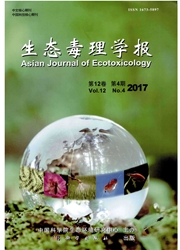

 中文摘要:
中文摘要:
介绍了一种基于大肠杆菌(Escherichia coli)的CellSense生物传感器毒性分析系统,对其毒性分析条件进行了初步优化,并探讨了其在重金属离子生物急性毒性分析中的应用性能.结果表明,以p-苯醌为电子传递介质时,基于大肠杆菌的CellSense生物传感器具有良好的毒性分析特性,测试得Hg^2+、Cu^2+、Zn^2+和Ni^2+四种金属离子的EC50分别为1.1、6.5、66.0和119.0μg·mL^-1;呼吸基质的pH低于6.0和盐度(NaCl)高于3%(w/w)时,对E.coli的活性产生一定的抑制作用.
 英文摘要:
英文摘要:
A cost-effective strategy using an amperometric biosensor with Escherichia coli (E. coli ) that provides a rapid toxicity determination of toxicants is described. The Cellsense biosensor system comprises a biological component immobilized in intimate contact with a transducer which converts the biochemical signal into a quantifiable electrical signal. It is showed that CeUSense biosensor with E. coli has a good performance when p-benzoquinone is chosen as redox mediator. The 50% effective concentrations (EC50)values of Hg^2+, Cu^2+, Zn^2+ and Ni^2+ are 1.1, 6.5, 66.0 and 119.0μg.mL^-1, respectively, which are in accordance with the results of conventional bacterial counting method. When the respiratory substrates pH is lower than about 6.0 and salinity(NaCl) is higher than 3%(w/w), the activity of E. coli is inhibited significantly.
 同期刊论文项目
同期刊论文项目
 同项目期刊论文
同项目期刊论文
 Development of a conductometric phosphate biosensor based on tri-layer maltose phosphorylase composi
Development of a conductometric phosphate biosensor based on tri-layer maltose phosphorylase composi 期刊信息
期刊信息
